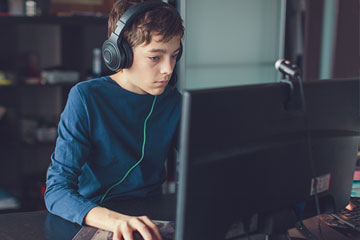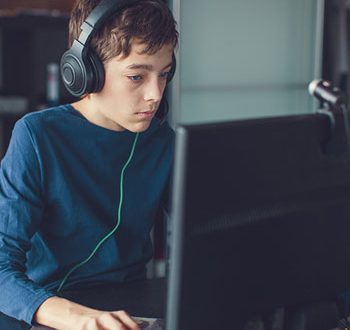Online gaming has become somewhat of a phenomenon amongst younger generations, with children constantly discussing their gaming and individuals making careers out of blogging about gaming. Games’ market research agency Newzoo reported that gaming generated $81.5 billion in revenue globally in 2014, which is double the revenue of the international film industry. So what is it about gaming that gets kids so excited?
Research from our Zeeko All Ireland Trend Report indicates that 43% of children in 3rd class are playing games such as Minecraft and 40% of children in 2ndrd class. The reality is that children are playing games for a whole array of reasons. From the entertainment factor to the cyclical sense of reward they experience, the vast majority of kids really enjoy gaming. However, there is growing psychological research into the effects of gaming on children. Our research at Zeeko has identified 4 key threats when your child is gaming: communication with a stranger, exposure to inappropriate content, cyberbullying and excessive internet use. Of course all of these threats are both a concern and a challenge to you as a parent.

So what can you do to protect your child when they are gaming? As always communicating with your child about gaming is crucial, your child may see what they are doing while playing games online as purely fun and may not realise that they need to be careful while gaming. Remind your child regularly of what information is appropriate to share and what is not and that it is ok to limit how and with whom, they share information.
On a very practical level, gaming systems are computers with software that needs to be kept up‐to‐date (just like your PC, laptop, phone or tablet). Security protections are built‐in and updated on a regular basis. Take time to make sure all the online gaming devices in your house have the latest protections. Another way of protecting your child is to ask for protection beyond passwords. Many account providers now offer, additional ways for you to verify who you are before you play games on that site. Make sure your child’s user name does not give away their real name, location, gender, age, or any other personal information. (Examples: beach01, book2). Your kids should also be encouraged to use an avatar, not an actual picture of themselves.
Another important protection is to ensure that your child is playing a game that is age appropriate. Our recent blog on Age Appropriate Games offers more detailed advice on this. At Zeeko we promote the Stop Block Tell Rule as a way for children to deal with cyberbullying or stranger danger. When your child is playing games online this rule is a very helpful one, to ensure that they feel empowered to deal with any unpleasant experience they may encounter while gaming.
Like every part of your child’s digital journey, gaming can be an educational experience and great fun, but it is very important that your child is given the guidance and support to ensure playing online games is a positive experience for them.
Here’s a great website on online gaming with additional information that you might find useful: http://www.internetmatters.org/advice/online-gaming/.
Here is a great glossary of terms used in Minecraft that will help you to learn more about the game: https://www.commonsensemedia.org/blog/the-minecraft-glossary-for-parents
The Zeeko Internet Safety Guide offers more advice and guidance on keeping your child safe online. If you would like to buy a copy of the book you can do so here.
We regularly post to our social media channels about developments in online safety. You can follow us on Facebook, Twitter and LinkedIn.
Frequently Asked Questions (FAQs)
Why is online gaming so popular with children?
Online gaming appeals to children because it is fun, interactive, and rewarding. Games often offer challenges, achievements, and social interaction, which can keep children engaged and excited. For many children, gaming is also a way to relax and connect with friends.
What are the main risks of online gaming and your child?
The main risks include communication with strangers, exposure to inappropriate content, cyberbullying, and excessive screen time. While gaming can be enjoyable, these risks mean children need guidance and supervision when playing online.
Can my child talk to strangers while gaming online?
Yes. Many online games allow players to chat or communicate with others, including strangers. Children may not always realise who they are talking to, which is why it’s important to remind them never to share personal information while gaming.
What personal information should children avoid sharing in games?
Children should avoid sharing their real name, age, location, school, passwords, or photos. Usernames should not include identifying details, and children should be encouraged to use avatars instead of real images.
How can I protect my child’s gaming accounts?
Make sure gaming devices and software are kept up to date with the latest security settings. Use strong passwords and, where available, enable extra security features such as two-step verification to protect accounts from being accessed by others.
How do I know if a game is age appropriate for my child?
Check age ratings, read reviews, and understand the content of the game before allowing your child to play. Age-appropriate games help reduce exposure to violence, inappropriate language, and unsuitable themes.
What is the Stop Block Tell rule and how does it help?
The Stop Block Tell rule teaches children to stop engaging with upsetting behaviour, block the person involved, and tell a trusted adult. It is a simple and effective way to help children handle cyberbullying or uncomfortable situations while gaming.
How can parents talk to children about safe online gaming?
Open and regular conversations are key. Ask your child what games they play, who they play with, and how they communicate in games. Keeping discussions positive helps children feel comfortable sharing concerns.
How much gaming is too much for a child?
Excessive gaming can interfere with sleep, schoolwork, and family time. Setting clear boundaries and encouraging a healthy balance between online and offline activities can help prevent overuse.
Can online gaming be beneficial for children?
Yes. When managed correctly, online gaming can support problem-solving skills, creativity, teamwork, and digital literacy. With the right guidance, online gaming can be a positive and educational part of your child’s digital life.
Explore Zeeko’s Home Page to discover our mission on the About Us Page, innovative Phone Blocking System, and engaging Phoenix Quest 10 programme. We provide Internet Safety Seminars, the Zeeko Report Card, and the Magical Leaders Choose Country initiative, alongside insights from our Digital Trend Report. Stay connected with us on Facebook and Instagram for updates.


No Comments Yet